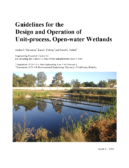Highlights
Mainstreaming Potable Water Reuse in the United States:
Strategies for Leveling the Playing Field
Released April 24, 2018

Advancing the Dialogue on Potable Water Reuse
ReNUWIt, the US EPA, and The Johnson Foundation at Wingspread offer solutions for leaders across the country to overcome institutional barriers to using highly treated wastewater for drinking water supply augmentation.
As interest in finding innovative ways to increase water reuse expands, Reinventing the Nation’s Urban Water Infrastructure (ReNUWIt), the U.S. Environmental Protection Agency (EPA), and The Johnson Foundation at Wingspread have teamed up to offer solutions for leaders across the country to overcome institutional hurdles of using highly treated wastewater to augment drinking water supplies. The ideas and insights are presented in a new report, Mainstreaming Potable Water Reuse in the United States: Strategies for Leveling the Playing Field.
“Over the past few years, nationwide interest in potable water reuse has grown as new projects have become operational in California and Texas. The technologies are easy to import to a new location, but the institutional aspects of permitting, financing and engaging the public can be challenging, especially in parts of the country that are only beginning to consider these types of systems,” says David Sedlak Deputy Director of ReNUWIt and Professor at the University of California, Berkeley. ReNUWIt is a research consortium encompassing academics from Colorado School of Mines, New Mexico State University, Stanford University and UC Berkeley.
The report aims to help municipalities and utilities considering potable reuse (supplementing drinking water with highly treated wastewater) to develop their approach and advance efforts of those ready to implement projects by drawing on the experience of a diverse group of experts and reviews current projects that are effectively reusing wastewater.
Additionally, partnering organizations hope the report serves as a guide for the EPA, state agencies, and other key stakeholders to champion the idea of making potable water reuse a mainstream drinking water option for cities throughout the United States.
"EPA supports water reuse as part of an integrated water resources management approach developed at the state and local level to meet the water needs of multiple sectors including agriculture, industry, drinking water, and ecosystem protection," says Peter Greavatt, Director, Office of Groundwater and Drinking Water, EPA Headquarters.
The report also outlines best practices aimed at building capacity and bolstering the efforts of leaders who lack experience in potable water reuse, but are contemplating the use or actively working to integrate the practice into long-term water supply plans.
Stemming from an intensive workshop convened by the EPA, ReNUWIt and The Johnson Foundation at Wingspread Oct. 25-27, 2017, the report captures insights and recommendations of utility managers, state and federal regulators, water sector association representatives, environmental advocates, academics, researchers, and equipment and service providers from across the U.S on how best to advance practices beyond communities that built pioneering projects, challenge institutional complexities and hurdles associated with implementing potable water reuse projects, and outline practical strategies to elevate potable reuse to the same state of legitimacy and acceptance as already established water resources.
“Water reuse is a misunderstood and underappreciated tool in addressing challenges of water scarcity, among other things. This report serves to shed light on water reuse and begin a new dialogue on how to remove the barriers to greater application of this valuable resource,” says Roger C. Dower, President of The Johnson Foundation at Wingspread.
For the last 50 years, municipal utilities, state and federal governments, researchers, and supporting organizations have been developing and testing technologies for modern potable water reuse systems, and in the last 25 years, significant progress has been focused on ensuring system performance and reliability, documenting contaminant removal and public health protection, and reducing project costs, especially in water-stressed states with a history of innovative water projects like California and Texas. However, many states and cities have found it difficult to carry out potable reuse projects and are seeking help in overcoming their challenges in building public support and obtaining funding and regulatory approvals.
Despite these challenges, and building on positive outcomes, interest in potable reuse is growing, especially in Colorado, Oklahoma, Virginia, North Carolina and Florida—locations that could benefit from the insights synthesized in this report, which provides a fresh look at key strategies that can help stakeholders overcome institutional hurdles to implementing potable water reuse projects.
For more information: https://www3.epa.gov/region9/water/recycling/

